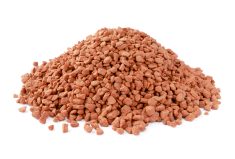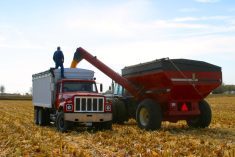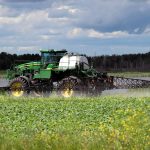China has used increased agricultural productivity and trade to beat back the famines that claimed millions of lives in the world’s most populous country five decades ago, but it still faces daunting food challenges, an economist who has spent his career studying the country’s food policies says.
“In fact in China today, obesity in children is a bigger problem than malnutrition,” said Colin Carter, the University of California researcher in an interview following his delivery of this year’s Kraft Lecture at the University of Manitoba.
Read Also

Mazergroup’s Bob Mazer dies
Mazergroup’s Bob Mazer, who helped grow his family’s company into a string of farm equipment dealerships and the main dealer for New Holland machinery in Saskatchewan and Manitoba, died July 6 from cancer.
The country that has become both the world’s biggest producer and consumer of food is likely to become increasingly dependent on exporters such as Canada in years to come, he said.
Since 1978, China’s average agricultural output has increased by almost five per cent a year versus two per cent in the United States. On paper, China was self-sufficient in food in recent years — not bad considering it has just 10 per cent of the world’s arable land and is feeding 20 per cent of its people.
It has also become the world’s biggest vegetable producer, accounting for 60 per cent of global production along with being a major producer of pork, apples and cereal grains.
- More on the Manitoba Co-operator: Canada’s trade relationship with China built on wheat
That productivity has come at a cost, however.

“If you look at the whole story of China’s agriculture it’s one of very intensive use of chemicals and energy… with all kinds of consequences for food safety and environmental impacts,” Carter said.
“The soil is polluted, the water is polluted.
“The air is polluted and it’s just shocking and sad to see the change in the environment in the last 30 years.”
The Chinese apply 10 kg of pesticides per hectare compared to one in Canada.
In 2013, Chinese farmers applied 44 million tonnes of chemical fertilizer up from 28 million in 2002. That’s almost three times what American farmers use, Carter said.
Poor farmers
Besides that, China doesn’t treat its farmers very well, he said.
Despite the tremendous rise in wealth in China, its 242 million farmers are almost as poor now as they were 30 years ago. And the income gap between them and their urban counterparts is rising.
“The farmers are not treated as normal citizens,” he said. “And you talk to government officials or other people and they don’t give a damn even though it’s a communist country.”
Chinese farmers make up 31 per cent of the labour force and contribute 10 per cent of the country’s GDP, but their operations are largely inefficient; they farm an average of one acre each. That hasn’t changed since 1949 when the Communist Party took control and collectivized the land, Carter said.
“That one acre may be cut up into three or four plots, so it’s very fragmented,” he said. “So that structure is simply not sustainable. The big issue in China of course is land tenure.”
Land tenure would allow some farmers to sell their land and move to apartments in the cities, opening an opportunity for the remaining farmers to expand and become more efficient.
But he said local officials in charge of land allocations are reluctant to give up control. “So it’s not an easy solution,” he said.
Carter said the Chinese government is buying foreign farmland and food companies, partly to secure food, but also to get new technology.
Stable growth
But he predicted it will also turn to foreign suppliers to keep food prices stable as its economy grows.
“I don’t think there is any question that China will become more dependent on international (agricultural) trade,” Carter said. “The middle class in China will demand higher food quality. It is going to be more interested in importing products.”
Carter agreed China doesn’t want to rely too heavily on the United States, its economic and political rival, for food imports, saying that bodes well for Canadian farmers.
As the world’s biggest soybean importer, there’s speculation it could become the biggest corn buyer too, Carter said. The debate continues over whether China will import feed to support growth in its domestic livestock industry or opt to import more pork, which would lessen the environmental concerns over excess hog manure.
In a soon-to-be-released paper, Carter argues China is poised to become an increasingly important market for Canada, especially in pork and dairy products — if the supply-managed industry here is allowed to return to exporting.
“I think we (Canada) have a comparative advantage in animal agriculture,” he said. “There’s growing world demand for some of our supply-managed commodities and we’re not participating. We have such a small market (domestically).”




















